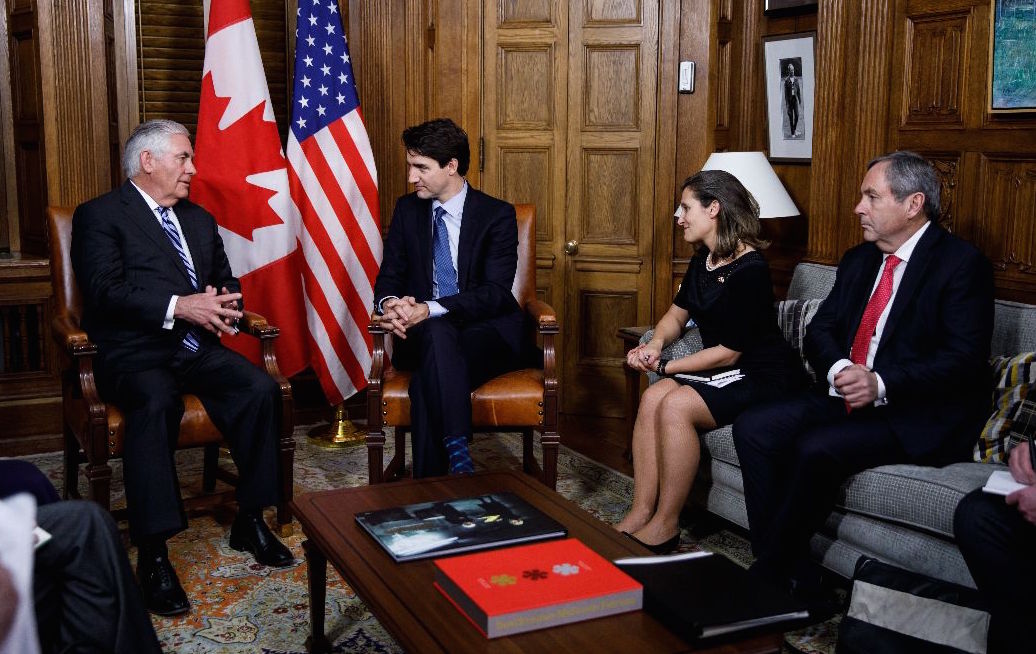The election of Donald Trump created an atmosphere verging on panic in Ottawa. How else to explain the Trudeau PMO decision to bring in disgraced former Progressive Conservative prime minister Brian Mulroney — he of the Airbus payoffs in brown paper bags — to advise them on what to do about the Trump promise to kill NAFTA.
Justin Trudeau and his close advisers fully expected to be dealing with Hillary Clinton following the 2016 U.S. presidential election. Secretary Clinton had been brought to Canada as a guest of Canada 2020, the think-tank close to Team Trudeau.
With Mulroney advising, and the Business Council of Canada and its president John Manley calling the shots, Team Trudeau opted to get out in front of Trump on NAFTA by calling for a renegotiation of the three-way treaty.
The die-hard Canadian continentalists consulted by Trudeau seemed to believe that Donald Trump, who had called NAFTA “the worst trade deal maybe ever signed anywhere, but certainly ever signed in this country,” could be persuaded to forget his campaign pledge to terminate NAFTA.
The Liberal government decided a broad coalition of U.S. state officials, industry executives, trade associations and Congressional allies coming out in support of NAFTA could scuttle the attempt by the U.S. president to kill the North American trade deal.
While the Liberals have successfully pursued the lobbying approach, focusing on the NAFTA network (while neglecting much else, including government business like appointing judges), the renegotiation strategy has given Trump an opportunity to return to a favourite theme from his successful election campaign: America First, or, nationalist protectionism.
The U.S. negotiating position at the NAFTA table consists of throwing out poison pills that Mexico and Canada are supposed to swallow in order to keep NAFTA talks alive.
Meanwhile Donald Trump goes out on the stump to boast that with him as president, America will win while Canada and Mexico will lose.
The U.S. president blames Democrats for selling out the auto industry and American manufacturing by signing NAFTA, the standout among one-sided trade deals that hurt Americans. He is hoping that his opposition to NAFTA will help elect Republicans in the November 2018 mid-term elections.
Trump’s latest affront to American trading partners is a proposed 25 per cent tariff on auto imports and imported auto parts, on the grounds that foreign car companies threaten national security. Trump and his Commerce Secretary Wilbur Ross say economic security is national security because imports threaten American jobs and incomes.
By invoking the national security argument (embodied in Article 232 of the American Trade Expansion Act, 1962) the U.S. has said loud and clear that whatever trade agreements are in force do not really matter, since a national security declaration by the U.S. government overrides all commitments to international trade agreements.
NAFTA watchers see the 25 per cent tariff as an open threat to Canadian and Mexican negotiators. Accept “rules of origin” in NAFTA that provide for much higher U.S. content in each North American automobile eligible for tariff free trade or else face a 25 per cent tariff.
The American “wield a big stick” approach to NAFTA leaves the Canadian renegotiation strategy looking like a dead end — and Canadian negotiators with a futile task.
No NAFTA would leave Canadian-U.S. trade covered by World Trade Organization rules. For Canada the energy put into negotiating a series of bilateral or regional deals would far better be served by a focus on improving the multilateral trade system.
The kind of “progressive” and feminist talk Team Trudeau has used on trade and international development, and plans to showcase at the upcoming G7 meetings, would at least have a chance of being heard, understood, and supported by other countries in a multilateral forum.
Dealing with the United States in the company of every other country in the world makes more sense than trying to talk Donald Trump into approving a “modernized” NAFTA.
Duncan Cameron is president emeritus of rabble.ca and writes a weekly column on politics and current affairs.




